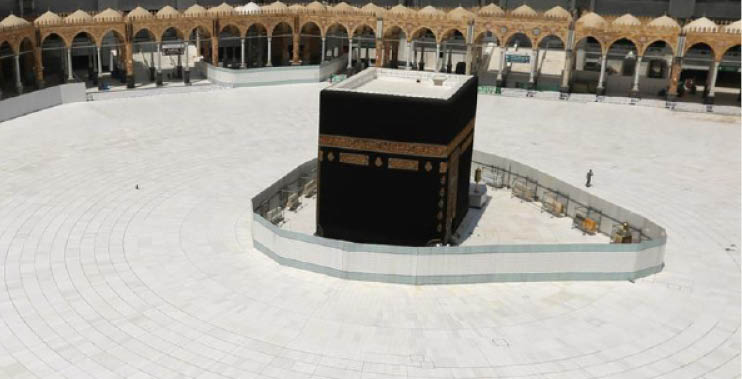Dhul Hijjah is here. It is the 12th and last month in the Islamic lunar calendar. Besides being the month during which Hajj (pilgrimage to Makkah) is performed, another virtue of Dhul-Hijjah in Islam is its mention as one of the months during which holy war is prohibited. Allah states in Qur’an 2:217 “They ask thee concerning fighting in the prohibited month; Say: Fighting therein is a grave (offence)…” The other months (classified as ‘Al Ash-hurul Hurum’ in the Qur’an) in which holy war is prohibited include Dhul-Qa’dah (which is the month preceding Dhul-Hijjah); Muharram (which is the month succeeding Dhul-Hijjah); and the month of Rajab.
The first ten days of Dhul-Hijjah, according to the Prophet (SAW), is a virtuous season. While the 9th day of Dhul Hijjah is Arafat day in which Muslims who are not on pilgrimage to Makkah are encouraged to observe voluntary fast, the 10th day is the Dahiyyah day during which Muslims offer animal sacrifices (ram, goat, cow or camel). All the six authentic compliers of hadith (except Buhari and Tirmidhi) relate on the authority of Abi Qatadah (RA) that fasting on Arafat day expiates for the sins of two years.
It is reported on the authority of Ibn Abbas (RA) that the Prophet (SAW) said “No days are as virtuous and beloved to Allah with respect to the days in which Allah’s servants put forth righteous deeds than the first ten days of Dhul-Hijjah.” Some people then asked the Prophet (SAW) whether the worth (reward) of these ten days supersedes that of fighting a holy war (jihad) in the cause of Allah. The Prophet (SAW) replied in the affirmative; and explained further that the virtues in the first ten days of Dhul-Hijjah exceed those of fighting in Allah’s cause except for a man who left home to fight in the cause of Allah with his life and wealth but returned with nothing (of his wealth).
Ibn Umar (RA) reported that the Prophet (SAW) said, “No day is greater in virtue and more beloved to Allah with regard to worshipping Him (Allah) than the first ten days of Dhul-Hijjah. We are encouraged to, for example, increase the rate of our recitation of the holy Qur’an during these virtuous ten days. We could also engage much in the glorification of Allah’s beautiful names by doing much of Tahlil (saying of: La ilaha illa llah); Takbir (saying of: Allahu Akbar); and Tahmid (saying of: Alhamdu lillah) in this season. Ibn Abbas (RA) explains that the text of Qur’an 22:28 “… And celebrate the name of Allah through the days appointed” refers to the first ten days of Dhul-Hijjah.
Imam Bukhari relates that Ibn Umar (RA) and Abu Hurayrah both used to glorify Allah (SWT) saying ‘Allahu Akbar’ even as they went to the market during the first ten days of Dhul-Hijjah. Imam Attirmidhi, Ibn Majah and al-Bayhaqi all relate on the authority of Abu Hurayrah (RA) that the virtues inherent in the worship of Allah in the first ten days of Dhul-Hijjah are beloved to Allah (SWT) so much that fasting for a day in this period is equivalent to fasting for a year just as standing in worship for a night during this period is equated to standing in worship on the Night of Power (Laylat ul-Qadr) in the month of Ramadan.
During these ten days, Muslims are also encouraged to spend their wealth in charity; and to share part of what Allah has given them with the poor. The amount of wealth spent as charity is not important. What matters is the spirit behind it. Allah states in Qur’an 65:7 “Let the man of means spend according to his means, and the man whose resources are limited should spend according to what Allah has given him. Allah puts no burden on any person beyond what He has given him…” It’s no longer news in Nigeria that hunger everywhere in the land. There could be no better time for assisting needy and poor Nigerians than now. Charity in the language of the Qur’an is “a beautiful loan to Allah”. What a beautiful ‘loan’, indeed, when Allah returns it to us!
On the cutting of hair or finger nails during the first ten days of Dhul-Hijjah, Imam Muslim reports that the Prophet (SAW) said, “If one of you intends to sacrifice an animal on the day of Eid ul-Kabir, then he/she should not cut the hair (on his/her body) and the finger nails (until after he/she has offered his/her animal for Dahiyyah on the Eid day)”. However, scholars opine that it is not absolutely haram (forbidden) to cut the hair or finger nails if necessities arise. Cutting one’s hair or finger nails does not affect the reward due to the individual who offered animal(s) in sacrifice and in total submission to Allah (SWT) on the Eid day. Adherence to this Sunnah helps believers to achieve greater reward as the hair and the finger nails would be reckoned as good deeds along with the hair on the skin of the sacrificial animal.
Big Sallah is by the corner. Let us take good advantage of the virtuous days in this sacred season with the same enthusiasm and commitment we usually demonstrate in the last ten days of Ramadan. Dhul-Hijjah is a season for repentance; a season for getting closer to Allah (SWT) with acts of worship; a season for making sacrifices and showing kindness to others; and a season for seeking Allah’s intervention in our common and individual challenges. As we give gratitude to Allah for His mercies and blessings in spite of our national challenges, let us use this period, which is the season’s climax, to passionately seek His intervention in Nigeria’s current moment of trials topped by the country’s ailing economy and the general insecurity of lives and property. May Allah accept our acts of worship and sacrifices, amin.

 Join Daily Trust WhatsApp Community For Quick Access To News and Happenings Around You.
Join Daily Trust WhatsApp Community For Quick Access To News and Happenings Around You.


